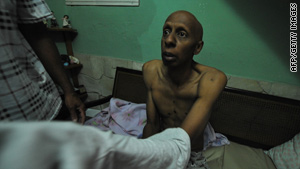Should Turkey Declare War on Iraq ?
From the usak-isro.blog., Saturday, 3 July 2010

Assoc. Prof. Sedat Laciner
The United States invaded Afghanistan, as it kept a group of terrorists. After refusal of the Taliban with regard to the extradition of Osama Bin Laden, the U.S. decided to invade Afghanistan. According to Americans, Afghanistan was now a source of terrorism and terrorist attacks like 9/11 were carried out by those who came based in Afghanistan. As a consequence of preemptive approach, the U.S. intervened to Afghanistan and pushed other allies to come to the country behind herself.
It can be definitely said that the U.S. was not successful in the past nine years: Currently, Afghanistan turned into a bigger source of terror and has made her neighborhood resemble herself. Despite her definite and clear failure, the U.S. has maintained her military-based policies in Afghanistan and expects international society to support herself with no hesitation.
By following the same logic, Turkey has to invade Iraq immediately: There are 5,000-6,000 PKK terrorists in northern Iraq, and they regularly cross the Turkish border in order to attack Turkey and return to Iraq. Places where all terrorists stay are evident. Unlike Bin Laden, they do not live in unknown caves. The coordinates of their camps are known by several states' security agencies. Moreover, different from Al Qaeda, they live in the Kandil Mountains, which can be besieged easily. If logistic support to the Kandil Mountain is prevented and crossing paths are controlled, it is clear that the PKK will be in trouble. Furthermore, hundreds of PKK terrorists leaving the camps move around in Iraqi territory. In other words, terrorists pass across areas already patrolled by U.S. soldiers and Barzani's Peshmergas, also under the control of U.S. air forces and satellites towards Turkey. Just after carrying out terrorist attacks, they return to the Kandil in front of the same eyes.
The PKK killed more than 5,700 civilians so far. The number of children killed by the PKK is over 370. In other words, if the PKK is not a terrorist organization, then who could be a terrorist? The PKK is enlisted as a terrorist organization by the U.S., Britain, Germany, France and many other states. Like the former U.S. President George W. Bush, the new President Barack Obama declared the PKK as a 'common enemy'.�American presidents said there is no difference between Al Qaeda and the PKK. Despite the situation and rhetoric, the PKK has managed to survive in Iraq, which everyone has known for years. In addition, from the 2003 Iraq War up until today, the PKK has multiplied its number almost three times under the wings of the U.S. forces.
Under these conditions, it is necessary to ask, should Turkey, just like the U.S., invade Iraq to stop terrorists' maneuvers? In the same way, should Turkey, likewise the U.S., seek help for counter-terrorism assistance as it is cited in Article 5 of the NATO alliance's agreement in case of being attacked by terrorists from outside?
Our American friends, in the face of these criticisms, present the difficulties of geography in Iraq, armed PKK militants etc. as an excuse. But in vain, it is strange that the U.S., a country that has taken the risk for many years to fight in Afghanistan, hesitates to involve in fighting against the PKK in a relatively easy geography.
Moreover, at this point it is necessary to ask how many PKK terrorists have been neutralized in Iraq by the United States since 2003. Let us ask our questions in a simpler way, since 2003, has a single PKK terrorist been harmed by the U.S. forces? Zero. The number of PKK terrorists who were captured, killed or harmed by U.S. forces is zero. In the last 7 years none of the 6,000 PKK militants was captured by the American friends.
Turkish people think the U.S. supports the PKK against Turkey. All surveys, studies and observations clearly prove that there is strong mistrust among the Turkish people against the U.S. PKK policies. Unfortunately, the statements we have described above reinforce these perceptions. Even some American journalists wrote that the U.S. provides financial assistance, ammunitions and training for the branches of the PKK.
The U.S. declares Syria and Iran on the lists of countries that support terrorism. Should Turkey prepare a similar list and includes the U.S.? Has the U.S., which has declared anyone as a terrorist, ever reviewed its own reports for Turkey in a sincere manner?
Clearly, it would be impossible to improve the relations between Turkey and the U.S. as long as the U.S.’s stance against the PKK remains the same. Under these conditions, the U.S. and Turkey can operate neither in the case of Iran nor in the fight against terrorism. In this context, the U.S. Defense Secretary Robert Gates, who claims Turkey walked away from the West due to errors of the European Union, has to consider the American mistakes as well. Obama says the PKK is a common enemy for Turkey and the U.S. while only Turkey, Syria and Iran fight against the PKK.
* Assoc. Prof. Sedat Laciner is the general coordinator of the International Strategic Research Organization, or USAK.



